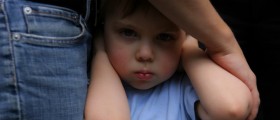
Even though conditions may vary, deafness is a state of suffering from hearing impairment where your hearing threshold is 81dB or higher with an average frequency of 0.5, 1, 2 or 4 kHz. People may lose their sense of hearing only on one ear or on both. However, hearing loss may be temporary or permanent. Usually, deafness is classified as complete hearing loss affecting one or both ears of a person.
In order for deafness to be treated, one needs to restore his/her hearing capabilities to a hearing threshold of at least 43dB for age over 14 and 31dB for age under 15.
Hearing Impairment and the World Around Us
If a child in school, for example, does not answer the teacher's question, he/she may have problems with his/her hearing.
In fact, according to WHO, 250 million individuals living on this planet suffer from hearing loss which can be moderate or severe. Furthermore, about 33% of these people live in developing countries and more than 50% of all cases of hearing impairment can be treated or avoided successfully.
Hearing loss in adults is one of major reasons for hardships and problems related to lifestyles in general. Also, these people spend many years living with this impairment, without ever finding the cure for their condition.
When Deafness Strikes
Deafness and hearing loss can seriously affect a child's language acquisition and cognitive skills, leading to numerous other problems such as poor performance in school, attention and concentration issues, social rejections and stigmatization, as well as life in poverty and unemployment.
People who face hearing loss or deafness in developing or extremely poor countries, usually do not have chances of getting treated or having medical care provided. Rather, easily treatable causes behind their problems can lead to various complications due to absence of proper medical care.
A Need for a Change
Many children and adults lose their gift of hearing every year due to the fact that they do not get the help they need. Therefore, people all over the world need to understand the risks of hearing loss and learn how to avoid these, especially if they spend time in loud and noisy environment. Teachers, workers, students, parents and all other members of the society need to know these facts and do their best to protect themselves and others as well as to understand this health problem and learn how to cope with it.
Most countries in the world lack national plans and programs for hearing loss prevention and many existing programs are highly insufficient and faulty. Health facilities need to be trained regarding hearing loss and provide medical care in these situations.
All in all, there is plenty of room for changes, but we need to make them while we can still hear. This way, we will help others and ourselves.

















Your thoughts on this
Loading...